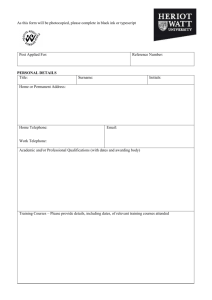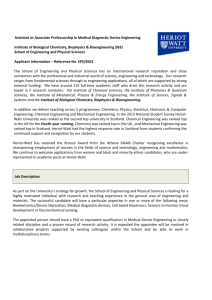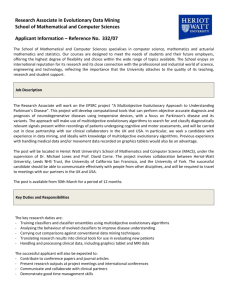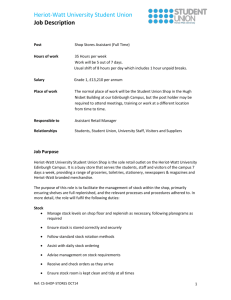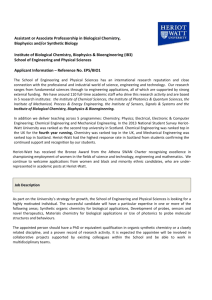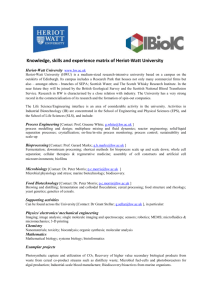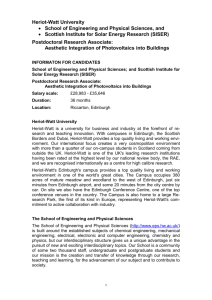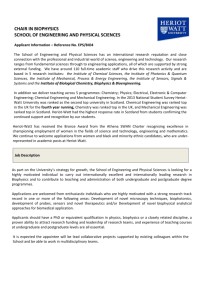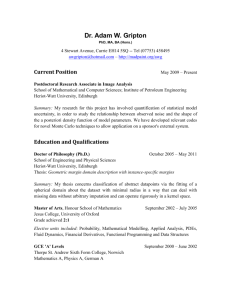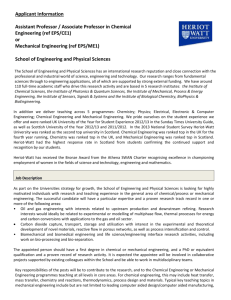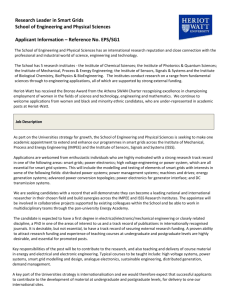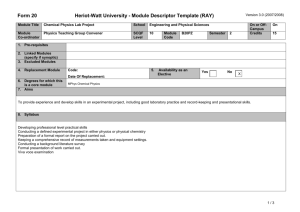Job Description
advertisement
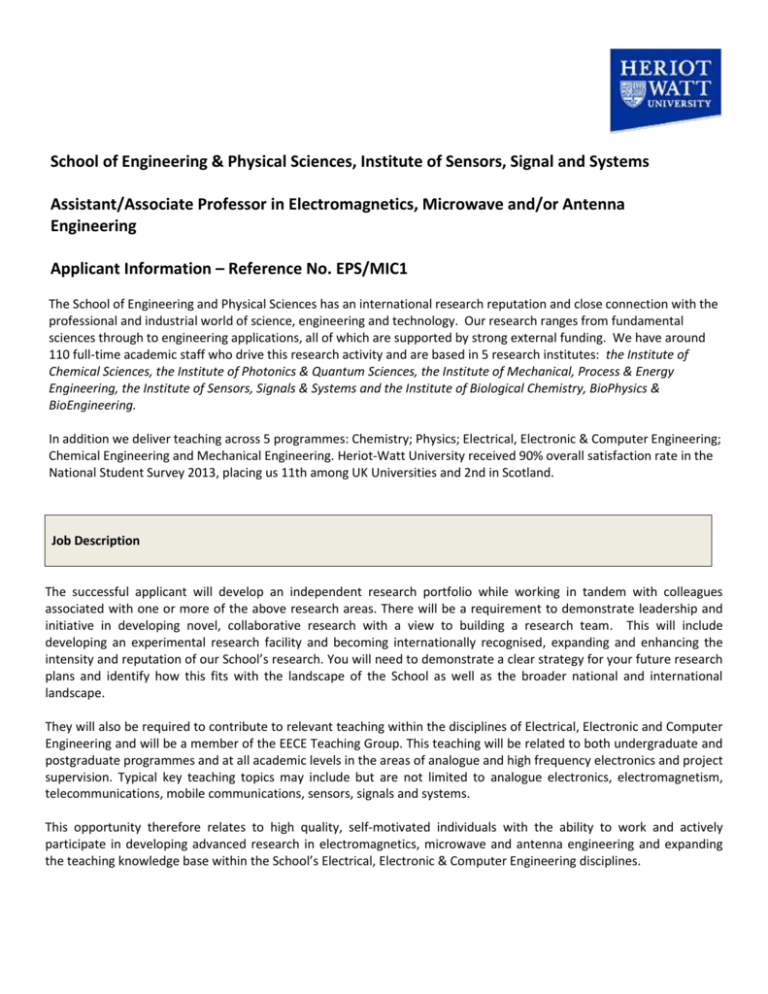
School of Engineering & Physical Sciences, Institute of Sensors, Signal and Systems Assistant/Associate Professor in Electromagnetics, Microwave and/or Antenna Engineering Applicant Information – Reference No. EPS/MIC1 The School of Engineering and Physical Sciences has an international research reputation and close connection with the professional and industrial world of science, engineering and technology. Our research ranges from fundamental sciences through to engineering applications, all of which are supported by strong external funding. We have around 110 full-time academic staff who drive this research activity and are based in 5 research institutes: the Institute of Chemical Sciences, the Institute of Photonics & Quantum Sciences, the Institute of Mechanical, Process & Energy Engineering, the Institute of Sensors, Signals & Systems and the Institute of Biological Chemistry, BioPhysics & BioEngineering. In addition we deliver teaching across 5 programmes: Chemistry; Physics; Electrical, Electronic & Computer Engineering; Chemical Engineering and Mechanical Engineering. Heriot-Watt University received 90% overall satisfaction rate in the National Student Survey 2013, placing us 11th among UK Universities and 2nd in Scotland. Job Description The successful applicant will develop an independent research portfolio while working in tandem with colleagues associated with one or more of the above research areas. There will be a requirement to demonstrate leadership and initiative in developing novel, collaborative research with a view to building a research team. This will include developing an experimental research facility and becoming internationally recognised, expanding and enhancing the intensity and reputation of our School’s research. You will need to demonstrate a clear strategy for your future research plans and identify how this fits with the landscape of the School as well as the broader national and international landscape. They will also be required to contribute to relevant teaching within the disciplines of Electrical, Electronic and Computer Engineering and will be a member of the EECE Teaching Group. This teaching will be related to both undergraduate and postgraduate programmes and at all academic levels in the areas of analogue and high frequency electronics and project supervision. Typical key teaching topics may include but are not limited to analogue electronics, electromagnetism, telecommunications, mobile communications, sensors, signals and systems. This opportunity therefore relates to high quality, self-motivated individuals with the ability to work and actively participate in developing advanced research in electromagnetics, microwave and antenna engineering and expanding the teaching knowledge base within the School’s Electrical, Electronic & Computer Engineering disciplines. Key Duties and Responsibilities Work activities will vary according to the requirements of the job and individual areas of teaching and research responsibility; however, general responsibilities are typically, but not restricted to, the following: actively engaging in research and actively contributing to the university’s research profile; publicising research through the preparation and submission of journal and conference papers and participating in academic conferences; supervising undergraduate students, postgraduate students and research associates’ research work; actively pursuing research funding through the development of quality grant proposals; develop cross-Research Institute, School, University and external research links and networks with a view to maximising research funding opportunities and associated activities; carrying our general research administration as well as contributing to School, Institute and research group strategic planning where required; managing and supervising research-active staff where required; establishing collaborative research and teaching links outside the university via funding councils, industry, business and public bodies; using research to inform teaching; representing the institution in a professional capacity, particularly with regard to research dissemination and development e.g. conferences, meetings, with industrial partners, etc; contributing to teaching through the delivery of lectures, tutorials and laboratories, assessing the relevant students’ work as well as setting and marking examinations and coursework; carrying out general academic administration including student recruitment and admissions, participation on committees and exam boards, taking responsibility for key discipline-specific administration tasks and mentoring students; designing, preparing and developing teaching materials and actively developing and implementing new teaching methods; undertaking continuous professional development (CPD) and participating in staff development activities. Please note that this job description is not exhaustive, and the role holder may be required to undertake other relevant duties commensurate with the grading of the post. Activities may be subject to amendment over time as the role develops and/or priorities and requirements evolve. Contractual Information Job Title: Assistant Professor / Associate Professor School/Section: EPS/ISSS Reporting to: Head of Research Institute Professor Marc Desmulliez Grade/Salary Range: Assistant Professor Grade 7, £29,837 - £36,661, or Grade 8, £37,756 - £45,053 Associate Professor Grade 9, £46,400 - £53,765 (dependent on qualifications and experience ) Pension Scheme: USS Annual leave: 33 days plus Building Closed days Duration of Post: Open-ended Working Hours: as required to fulfil duties Sickness benefits: up to 6 months full pay + 6 months half pay Disclosure Scotland Requirement: N/A Start Date: to be agreed Person Specification This section details the attributes e.g. skills, knowledge/qualifications and competencies which are required in order to undertake the full remit of the role. Attributes Essential Education & Qualifications (technical, professional, academic qualifications and training required) PhD in electrical engineering or physics Postdoctoral research experience in an academic or industrial environment Experience (Examples of specific experience sought. For Academic posts state type of publications expected as well as teaching, research, professional / industrial / commercial, consultancy, managerial and administrative experience ) Journal publications in major journals such as IEEE Transactions University administrative experience Good publications record in an appropriate field. Demonstrates appropriate research leadership and vision. In-depth knowledge of electromagnetics, microwave and antenna engineering. Understanding high frequency electronics and/or antennas and relevant systems Evidence of research in any the fields mentioned previously. Have ambitious and realistic future research plans. Desirable Has reasonable industrial experience and/or links. Has acquired background knowledge of the University and the School. Involvement in managing research team and/or supervision. Has been involved in the award of research funding. Evidence of recent funding. Evidence of a strategic approach in future research plan. Knowledge of the research landscape and funding bodies Evidence of teaching (Assistant Professor) Evidence of teaching (Associate Professor). Involvement in managing research. Lecturing and assessment experience. Course development experience. Competencies, Skills& Good, lucid, clear communicator. Knowledge (e.g. effective communication skills, initiative, flexibility, leadership etc) Good presentation skills. Shows leadership. Demonstrates evidence of willingness to be involved in collaborative research. Explains concepts well. Demonstrated initiative in teaching and research. Special Factors (if applicable) Essential Criteria – these are attributes without which a candidate would not be able to undertake the full remit of the role. Applicants who do not clearly demonstrate in their application that they possess the essential requirements will normally be eliminated at the short listing stage. Desirable Criteria – these are attributes which would be useful for the candidate to hold. When short listing, these criteria will be considered when more than one applicant meets the essential criteria. Other Relevant Information For an informal discussion of the post contact Professor Marc Desmulliez (0131 451 3340, m.desmulliez@hw.ac.uk) or Dr. George Goussetis (0131 451 3055, g.goussetis@hw.ac.uk) Application Process If you would like to be considered for either opportunity, please submit your CV, publication list and a 1 page statement of how you meet the criteria in the person specification, to research-jobs@hw.ac.uk no later than 31 August 2014. For all applications and correspondence about your application, please quote ref: EPS/MIC1 The University is committed to equality of opportunity. Applications are particularly welcome from women and black and minority ethnic candidates, who are under-represented in academic posts at Heriot-Watt. Heriot-Watt University and Values With a history dating back to 1821, Heriot-Watt University has established a reputation for world-class teaching and practical, leading-edge research, which has made us one of the top UK universities for business and industry. We’re a vibrant, forward-looking university, well known for the quality of our degrees with employers actively seeking out our graduates. Heriot-Watt is also Scotland’s most international university with an unsurpassed international in-country presence. We deliver degree programmes to 11,800 students in 150 countries around the world, have a campus in Dubai and in Malaysia and boast the largest international student cohort in Scotland. At Heriot-Watt we’ve created an environment that nurtures innovation and leadership - where our researchers, staff and students can realise their potential and develop their ambitions. We’re proud of our collegiate atmosphere and integrated teaching and research approach which has helped to build a community of committed academics and highly motivated students. Our focus on careers delivers results and we’ve an excellent reputation for graduate employability. We have campuses in Edinburgh, the Borders, Orkney, Dubai and Malaysia where we aim to provide stimulating, supportive environments conducive to effective learning and research, and where staff and students can excel. At Heriot-Watt, we have an established set of values that help us to nurture innovation and leadership, and show our commitment to continuous improvement and development in all our activities. Our values describe our deeply held beliefs and our community spirit. They characterise not only how we are as a higher education institution but also frame how we want to be. Our values are: o o o o o Valuing and respecting everyone Pursuing excellence Pride and belonging Shaping the future Outward looking As a learning, living and working institution, we use our values as the building blocks of how we go about doing our work and how we conduct ourselves as part of Heriot-Watt University. They represent what binds us together as a University community and help us to become the best at what we do. It's key that all our staff feel part of our achievements, and our values provide your link to our success. For full details on our University please view our website, www.hw.ac.uk Heriot-Watt University is a charity registered in Scotland (SC000278).
